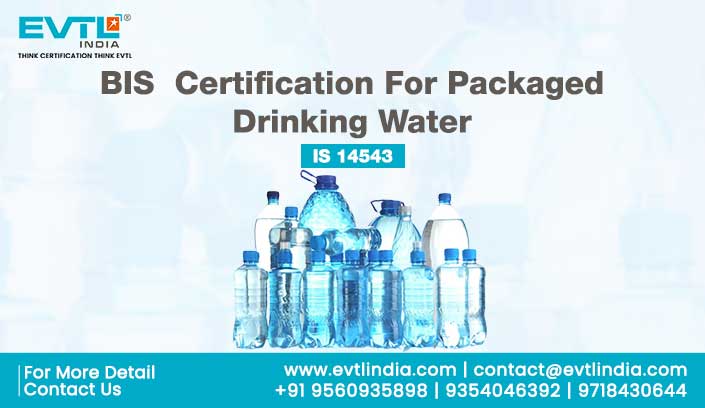Overview of BIS Mark Certification For Packaged Drinking Water IS:14543
BIS stands for the Bureau of Indian Standards. It is the national standard body of India. It was established under the BIS Act of 2016. The primary purpose of BIS is to promote the harmonious development of standardization, marking, and quality certification activities for various goods. When it comes to selling packaged drinking water or natural mineral water in India, it becomes imperative to comply with the specified standards set by BIS. Obtaining certification from BIS is essential in demonstrating that the water is safe and meets the government's mandated requirements.
Standard for Packaged Drinking Water
The sale of packaged drinking water and natural mineral water in India is regulated by the Food Safety and Standards (Prohibition and Restriction on Sales) Regulation of 2011. According to these regulations, packaged drinking water must adhere to the standards specified in IS 14543:2016, while packaged natural mineral water must meet the standards outlined in IS 13428:2005. To ensure compliance with these standards, both packaged drinking water and natural mineral water must undergo certification by the Bureau of Indian Standards (BIS). The BIS Certification Mark is a requirement, and it signifies that the product has met the necessary standards and is safe for consumption. It is prohibited to manufacture, sell, or display packaged drinking water or natural mineral water without this certification mark.
Requirements for Packaged Drinking Water
Packaged drinking water must meet specific requirements outlined in IS 14543:2016, a standard designed for bottles, jars, and similar containers. The standard establishes limits for various factors to ensure the safety of the water. It sets limits for physical parameters such as Total Dissolved Solids (TDS) and Turbidity, ensuring clear water with an appropriate level of dissolved solids.
Microbiological parameters are also addressed, with limits set for contaminants like E. coli, yeast, and mold to guarantee the absence of harmful bacteria and fungi. Chemical parameters, including pH, are considered as well, with limits defined to ensure the waterfalls are within a safe range for consumption.
Additionally, the standard addresses the presence of pesticides and radioactive residues, establishing limits to safeguard against harmful levels of these substances. By adhering to these requirements, packaged drinking water can provide consumers with safe and high-quality water for their hydration needs.
Testing Procedures for Packaged Drinking Water
Testing procedures for packaged drinking water involve several key steps.
1. A well-equipped laboratory is necessary to conduct tests according to Indian standards. The laboratory should have the required equipment and facilities to perform accurate and reliable testing.
2. It is important to keep comprehensive test records, documenting the analysis and test results. These records should be maintained in approved forms and made available upon request by BIS for review and verification.
3. Quality control measures should be implemented, including the use of Statistical Quality Control methods and calibration control for instruments and equipment. This ensures the accuracy and consistency of test results.
4. The Standard Mark, indicating compliance with all specification requirements, should be applied to the label or pouch of the bottle/container. This mark serves as an assurance of quality and conformity to the applicable standards.
Lastly, the source water used in the production of packaged drinking water should be initially tested for various parameters such as color, odor, taste, turbidity, pH, total dissolved solids, and microbiological and chemical requirements. This includes testing for toxic elements, pesticide residues, and radioactive residues. By conducting these comprehensive tests, the quality and safety of packaged drinking water can be ensured, providing consumers with a reliable and trustworthy product
Packaging and Marking Requirements
This information includes details such as
To get the License the requirements should be fulfilled
Procedure for BIS ISI Certification
Conclusion
You can contact us via email at contact@evtlindia.com or by phone at 9560935898. Feel free to get in touch with us anytime for the support you need.
EVTL India Services
Registration Consultant || CRS Certification | ISI Domestic Manufacture | ISI Foreign Manufacture | WMI Registration | ISI Mark Registration | EPR Registration for Plastic Packaging | EPR Registration for Electronic Waste Management | EPR For Re Ryclers | EPR Registration for Battery Waste Management | MOEF License | EPR Certificate | EPR Registration For Tyre Waste Certificate | EMI EMC Test | RF Testing | IP Rating Test | TEC Approvals | NABL Testing | LM-79 And LM-80 | ROHS Approval | CE Certification | TradeMark | Copy Right | CDCO Approvals | Drag License | WPC Certificate | BEE Registration | Fssai Registration | GEM Registration | TSDF Facility | Import Export License | Lab Setup And Lab Equipment | NOC For Steel | Legal Metrology | Make In India Mark | Certificate Consultant | ISI Certification |





